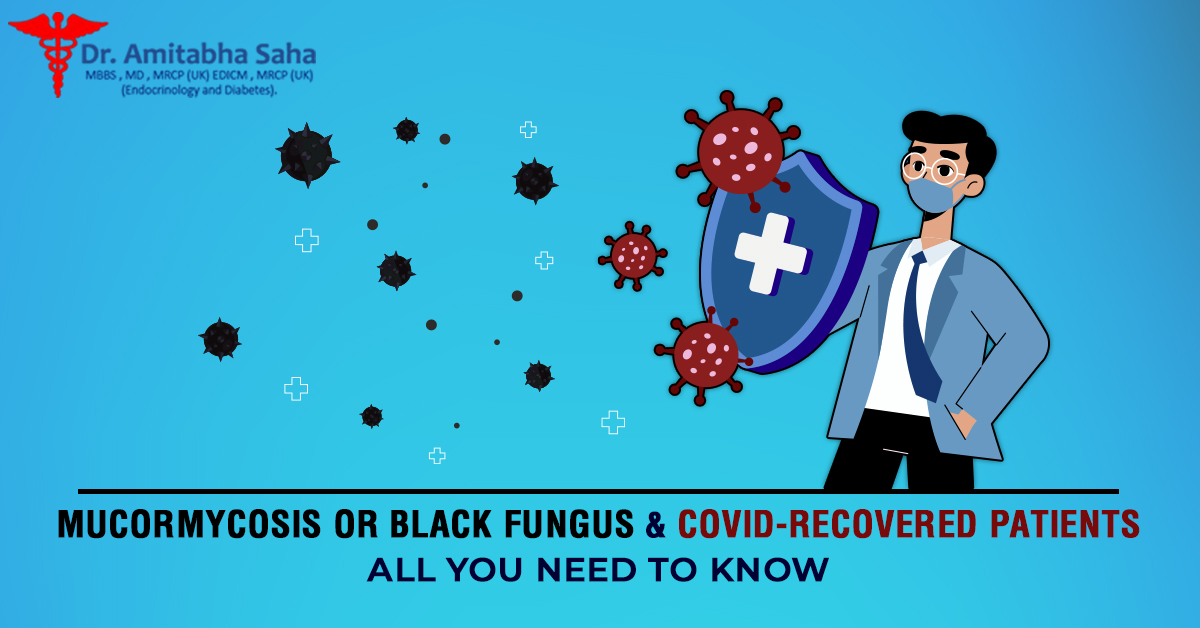Although India is already fighting to recover from the rise in Covid cases and death and giving an iron fist to the second wave, the storm is yet to get sinister. Covid is yet to leave us and amidst this catastrophe, India reposts a rise in Black fungus cases as well among Covid-recovered patients.
The Covid doctors in Kolkata state that it is treatable if diagnosed early. Patients who fail to seek medical help on time may lose organs like eyes, nose and such essential parts that may affect the mental status of the patient as well.
Finding it new?
Again?
We feel you!
Let us dive deeper into the topic…
What is Mucormycosis?
Mucormycosis, colloquially known as ‘Black fungus’, is a rare but severe and dangerous fungal infection that is caused by a group of moulds termed mucormycosis, present in the environment.
To add to your knowledge, our body has been dealing with Black fungus for a long time. Those who have pre-existing health conditions fail to battle Mucormycosis. Patients with critical diseases, or those who are under medication that compromises the immune system of the body, like Covid, seems to contract the disease.
How do one contract Mucormycosis?
Patients often get infected through contact with the fungal spores present in the environment. Mucormycosis tends to occur when someone inhales the fungus, or it enters the body through the skin. This can happen if there is a scrape, wound, burn on the skin or the patient has any kinds of skin injury. Additionally, one can get Mucormycosis if the individual inhales the spores from the surrounding air.
Who is at risk?
Typically, people with a pre-existing disease and under serious or critical treatment can get Mucormycosis. It is because the medication to deal with critical illness is comparatively strong and hence compromises the immune system. This is when the body fails to fight against Mucormycosis and the person seems to be infected.
Some of the pre-existing diseases include –
- Prematurity and low birthweight (for neonatal gastrointestinal mucormycosis)
- Organ transplant
- Diabetes, especially with diabetic ketoacidosis
- Neutropenia (low number of white blood cells)
- Cancer
- Long-term corticosteroid use
- Stem cell transplant
- Too much iron in the body (iron overload or hemochromatosis)
- Skin injury due to surgery, burns, or wounds
- Injection drug use
Added to the above list is Covid-19 or Novel Coronavirus.
India records a spike in the cases of Mucormycosis, especially amongst those suffering from Covid or who have recovered.
But is Mucormycosis as contagious as Covid?
Well, no!
A sign of relief! Mucormycosis is not contagious at all and cannot be transferred from one person to another.
What are the symptoms of Mucormycosis?
Depending on the type of Mucormycosis, our symptoms may vary. Generally, Mucormycosis affects the skin, the lungs, the sinus and the brain. Some of the common symptoms may include.
- Sinusitis, nasal blockage or congestion
- Thrombosis
- Blackish discolouration over the bridge of the nose or palate
- Toothache
- Skin lesion
- One-side facial pain or numbness
- Blurred or double vision with pain
- Black lesions on the nasal bridge or upper inside of the mouth that quickly become more severe
- Chest pain and worsening respiratory symptoms
- Fever
- Shortness of breath
- Cough
In case you have been infected with skin Mucormycosis you might experience pain, redness, warmth, and swelling around the wound.
How can it be prevented?
To prevent Mucormycosis the expert Covid doctors in Kolkata recommends maintaining and monitoring blood sugar levels post-Covid-recovery. If on steroids, it should be used in the correct doses, timings, method and duration. During oxygen therapies, only clean and sterile water should be used in the humidifiers. Also, if the patient is on antifungal medicines and antibiotics, the medicines should be taken on time, and in the right dose.
What is the possible treatment?
Mucormycosis can be treated with antifungal drugs. However, it will require surgery in the longer run. The expert Covid doctors in Kolkata suggest lesser steroid use and discontinuation of immunomodulatory drugs. Also, diabetes should be controlled to reduce the adverse effects of the disease.
As per the health department, medical treatment includes an infusion of saline intravenously (liposomal Amphotericin B infusion), maintaining systemic hydration, using peripherally inserted central catheter, considering antifungal therapy for minimum of six weeks and monitoring the affected with radio imaging to detect the progression of the treatment. Other drugs like Isavuconazole are also effective in such cases.
Worst case scenario, Mucormycosis may require surgery (as mentioned above) and the infected tissue needs to be removed.
One must remember that if Mucormycosis is left untreated, or if there is a delay in the treatment, the disease can turn dangerous or fatal and often leads to blindness or even death.
In case you have been experiencing the above symptoms, consider getting in touch with ace Covid doctors in Kolkata like Dr. Amitabha Saha and deal with the condition accurately.
While you consult, make sure that you learn about the treatment process in detail to avoid complications during the treatment process.
For more information, get in touch today!
